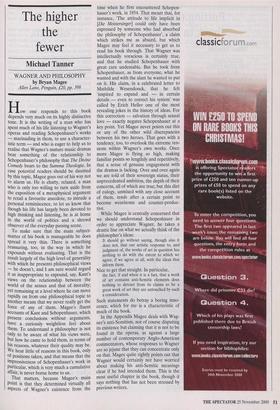The higher the fewer
Michael Tanner
WAGNER AND PHILOSOPHY by Bryan Magee Allen Lane, Penguin, £20, pp. 398 How one responds to this book depends very much on its highly distinctive tone. It is the writing of a man who has spent much of his life listening to Wagner's operas and reading Schopenhauer's works — marinading in them, to use a character- istic term — and who is eager to help us to realise that Wagner's mature music dramas bear something of the relationship to Schopenhauer's philosophy that The Divine Comedy bears to the Summa Theologia. In case potential readers should be daunted by this topic, Magee goes out of his way not to alarm us. He is chatty, relaxed, a man who is only too willing to turn aside from the exposition of a metaphysical argument to retail a favourite anecdote, to intrude a personal reminiscence, to let us know that though his life has largely been devoted to high thinking and listening, he is at home in the world of politics and a shrewd observer of the everyday passing scene.
To make sure that the main subject- matter of his book is manageable he does spread it very thin. There is something reassuring, too, in the way in which he expounds without evaluating. That is the result largely of the high level of generality with which he presents philosophical views — he doesn't, and I am sure would regard it as inappropriate to expound, say, Kant's views on the relationship between the world of the senses and that of morality; yet remaining at a level where he can move rapidly on from one philosophical topic to another means that we never really get the force of any of them. Magee's fluent accounts of Kant and Schopenhauer, which present conclusions without arguments, have a curiously weightless feel about them. To understand a philosopher is not only to be aware of what his views were, but how he came to hold them, in terms of his reasons, whatever their quality may be. We hear little of reasons in this book, only of positions taken, and that means that the impressiveness of Schopenhauer's work in particular, which is very much a cumulative affair, is never borne home to us.
That matters, because Magee's main Point is that they determined virtually all aspects of Wagner's existence from the time when he first encountered Schopen- hauer's work, in 1854. That meant that, for instance, 'The attitude to life implicit in [Die Meistersinger] could only have been expressed by someone who had absorbed the philosophy of Schopenhauer', a claim which strikes me as absurd, but which Magee may feel it necessary to get us to read his book through. That Wagner was intellectually voracious is certainly true, and that he studied Schopenhauer with great care undeniable. But he took from Schopenhauer, as from everyone, what he wanted and with the slant he wanted to put on it. His claim, in a celebrated letter to Mathilde Wesendonck, that he felt `inspired to expand and — in certain details — even to correct his system' was called by Erich Heller one of the most revealing jokes in the history of ideas. For this correction — salvation through sexual love — exactly negates Schopenhauer at a key point. Yet Magee never points out this or any of the other wild discrepancies between his two heroes. That goes with a tendency, too, to overlook the extreme ten- sions within Wagner's own works. Once more Magee is flying so high, making familiar points so lengthily and repetitively, that a sense of genuine engagement with the dramas is lacking. Over and over again we are told of their sovereign status, their unprecedented ambition, the depth of their concerns, all of which are true; but this diet of eulogy, unmixed with any close account of them, tends after a certain point to become wearisome and counter-produc- tive.
While Magee is centrally concerned that we should understand Schopenhauer in order to appreciate Wagner, he takes a drastic line on what we actually think of the philosopher's ideas:
It should go without saying, though alas it does not, that our artistic response to, and judgment of, the works of art in question has nothing to do with the extent to which we agree, if we agree at all, with the ideas that inform them.
Nice to get that straight. In particular,
the fact, if and when it is a fact, that a work of art contains anti-Semitic elements does nothing to detract from its claims to be a great work of art they are untouched by such a consideration.
Such statements do betray a boring inno- cence, which for me is a characteristic of much of the book.
'In the Appendix Magee deals with Wag- ner's anti-Semitism, not of course disputing its existence but claiming that it is not to be found in the operas, as against a large number of contemporary Anglo-American commentators, whose responses to Wagner are so jejune that they can concentrate only on that. Magee quite rightly points out that Wagner would certainly not have worried about making his anti-Semitic meanings clear if he had intended them. This is the most useful chapter in the book, though it says nothing that has not been stressed by previous writers.





























































































 Previous page
Previous page